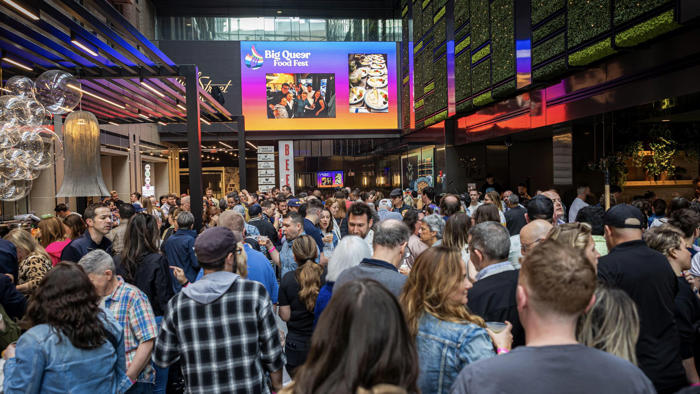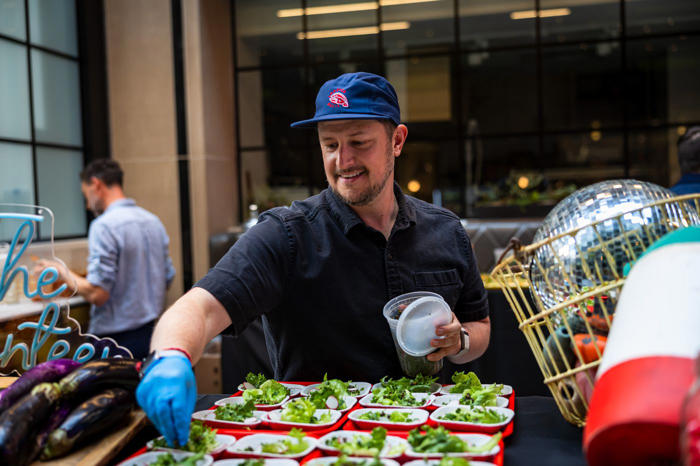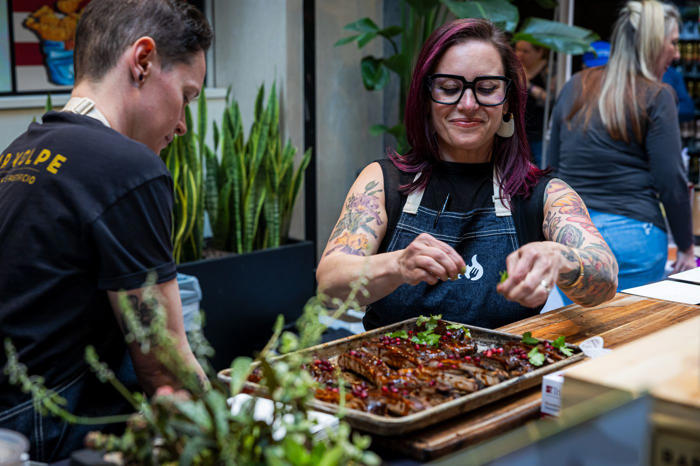How the Big Queer Food Fest Was Built

In May, the Big Queer Food Fest took place in Boston.
Being of the generation raised by Food Network, Top Chef, and Anthony Bourdain, I developed certain ideas of what a chef looked like. A chef could be bawdy and brash or obsessed with science. They could be militant in their cleanliness, or exude more of a rebellious, rockstar energy. They could be a man or a woman (but only one of those genders), and if they were women, they either had to outdo the men’s brashness or be goddesses of the home kitchen. I didn’t consciously think chefs couldn’t be queer — none of these qualities preclude anyone from queerness — but it just didn’t occur to me that anyone I saw would be.
Chad Hahne and David Lewis had a similar feeling. Through their work in food television, Hahne and Lewis realized many chefs didn’t have the space or encouragement to bring their queer identities to their work. Last year, they launched the Big Queer Food Fest, a series of dinners and chef collaborations centering queer chefs and food producers, leading up to a multi-day event in May 2025. BQFF has featured chefs like Tiffani Faison, Eric See, Catie Randazzo, and Rashida Holmes, and this year has partnered with the James Beard Foundation on Pride Month programming.
It feels like queer food is booming and buzzy. But as Hahne and Lewis say, many chefs still don’t feel comfortable putting their queerness front and center. And due to ongoing anti-LGBTQ legislation across the country, some have had to reconsider where they do business. We spoke to the co-founders about what it means to celebrate queer food on this scale, and why queer food deserves the spotlight.
Eater: What were your relationships to the food industry before founding the Big Queer Food Fest?
Chad Hahne: I started out at 17 as a bartender, and through college, I was a bartender and waiter. And then when I moved to New York, the first job I found very much on purpose was in a queer restaurant, the Viceroy. I really moved to New York to find a community; I’m from the Midwest, and I wanted to explore my queerness, which I really couldn’t do at that time. From then, the food world has always been influential in my life. I’ve moved on to do queer documentaries, and we’ve been producing Food Network television shows for over 10 years, where we try to showcase queer talent as much as possible.
David Lewis: I started working in restaurants and in catering in college in Chicago, but similar to Chad, being a TV producer became my full-time career. I’ve always worked on projects in tandem in the queer community. But we were looking to find a way to marry these two worlds that we are a part of together. Being able to meet different chefs everyday while we’re on set, and interviewing them and telling their stories, we just found that there was a real void in having a space to celebrate the queer community through food, especially on a more national stage.
Even a decade ago, it felt difficult to talk about or to feature queerness on television, even if you were working with queer chefs. What made you realize an event like this was needed, and possible, on this scale?
CH: As queer people, we see our influence in art and fashion and music. But I remember the first time I heard James Beard was gay, which was only a couple of years ago, and I thought, Oh my gosh, he was gay? I read some more from John Birdsall, and I realized that there is this perspective on queer food. If there’s not a name for something, if it’s not discussed, it’s hard to explore. We just saw a need to celebrate queer chefs, put them on a pedestal, celebrate our history, and move forward together.
DL: I’ve had more and more access to the food festival world through the celebrity chefs that I work with, and you can find [food] festivals that are based on location like Aspen or Los Angeles, but they’re just trying to bring in a wide array of different people and perspectives. We wanted to create something that’s more focused about a part of our community that’s often kept behind closed doors. As we’ve talked to more people about it, who are in the food festival industry, there’s just a lot of enthusiasm, and they’re kind of surprised that nothing like this has existed before.
Your first event was last year, what were your goals, and how have they changed as you held more events?
DL: Our goal was really to announce this brand and start getting some support, and to start the momentum for building an actual festival. And we realized after that dinner, as we’re starting to put pieces together, that we already missed doing dinners and having events that involved more chefs. We’re about to have our sixth event with the James Beard Foundation in New York, with more on the way for the rest of the year.
CH: When we held our first event last July, we thought we would be building towards one yearly event. And we’ve realized that it’s probably better for us to have events in different locations across the country to help celebrate queer communities. We’re going to Nashville in two months to celebrate some queer chefs in the South.

Rob Anderson at the Big Queer Food Fest.
What are some things you’ve learned about queer food since you started?
CH: [Queer food] is not easy to define, which I think makes it all the more incredible. There’s a quote that I always go back to [from Kyle Fitzpatrick], “There is no such thing as queer food, but once you start looking it’s everywhere.” I think it’s a world that we’re still exploring and learning about, and it’s really exciting. And once you do discuss it, you see that the influence has always been there.
DL: It’s really about being able to be celebratory of someone like a chef as an individual, and letting them bring their personality and their identity to the plate. What’s been really fun about these events is giving our chefs the ability to conceive of their own menu items, and to name them and to find themes amongst them. We all get together to collaborate on that. And just seeing where that goes has been really interesting. Every event has its own shape, form, style, and voice. It’s just a level of fun and expression that I think is hard to find elsewhere.
CH: Also we’re celebrating queer winemakers, queer spirit makers, we celebrate queer community organizations, we have speakers. So our dinners are really holistic queer events that are really fun.
What sort of impact have you seen these events have?
DL: We just had a dinner in March, with one of the chefs with us was Catie Randazzo, and they hadn’t really seen an event like this before. They were influenced by being a part of this event and built another queer potluck pop-up for pride here in LA. It’s great to see how universal it is to break bread with your community, and see the people who came in as strangers leaving with just really strong connections with everyone around them.
Conversely, what are the limits of these sorts of events? What haven’t you been able to accomplish that you wish you could?
CH: We would love to grow in the number of chefs and purveyors we highlight. It’s about managing that growth. But we’ve realized there are so many queer chefs and purveyors who want to participate and who want to celebrate their queerness in food. So we’re just trying to grow that platform to give people this opportunity as well.

Karen Akunowicz.
It’s sort of amazing that there are so many chefs that identify as queer, because for so long, the restaurant space felt really macho and patriarchal. And so the idea of being an out queer chef, was just something that either people didn’t talk about, or that wasn’t something that you advertised. What are your thoughts on that change?
DL: I think it’s happening very quickly. But there is still a lot of progress to be made, especially in smaller cities or towns where it can be really difficult still. Discrimination is still very elusive when you’re trying to call it out. As we’ve been putting events together, there have been a lot of really prominent, white, straight, male chefs that have asked to be part of our dinners. And they’ll joke with me, like, Oh, I’m not queer enough to be invited to cook with you guys. It’s just kind of a funny flip of it.
CH: There’s a lot of room for growth for acceptance within the restaurant and culinary world. We’ve run into that with some of the chefs we have worked with who have moved states in order to find locations that are more accepting. Even in Los Angeles or New York, if you go 20 or 30 miles outside the city, you’re going to find environments that are not fully accepting. So I think the more visibility, the more community we build, the better for everyone.
DL: Seeing how a lot of anti-LGBTQ legislation has been popping up so quickly and has been put in place in certain states so fast, there is a real whiplash effect. A lot of chefs are having to reassess and relocate based on fear of where these laws might go, and what impact they might end up having without even knowing yet. We met a chef who recently moved from Nashville to LA not because Nashville itself is so oppressive or scary, but Tennessee at large has been passing a lot of really scary legislation. She’s not the only one we’ve met.
CH: The more events we have the better, considering where we’re at politically in this country.
It’s Pride Month right now and things can feel very joyous. But how do you think we should be celebrating and supporting queer chefs and queer food the rest of the year?
CH: The first part is being able to identify them, and right now more chefs are starting to have that be part of their culinary identity. And then once we know who our community is, I think there’s a strong desire to support each other, and also to support each other year round, and not just do events in June..
DL: I think also, there’s been a lot of discussion over the past few years about gay bars disappearing. And I think that’s not entirely true. Being able to use food as a vehicle for community is really important, so is being able to support queer bars or restaurants, queer food and drink spaces. We end up building community just by supporting those around us.
This interview has been edited and condensed for length and clarity.
